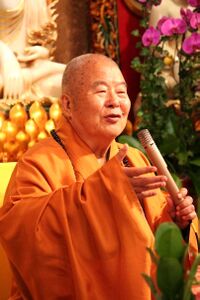Yun, H.: Difference between revisions
(Created page with "{{Person |HasDrlPage=Yes |HasLibPage=Yes |pagename=Yun, H. |MainNamePhon=Hsing Yun |SortName=Yun, Hsing |namefirst=Hsing |namelast=Yun |bio=Hsing Yun (Chinese: 星雲; pinyin:...") |
No edit summary |
||
| Line 2: | Line 2: | ||
|HasDrlPage=Yes | |HasDrlPage=Yes | ||
|HasLibPage=Yes | |HasLibPage=Yes | ||
|MainNamePhon=Hsing Yun | |MainNamePhon=Hsing Yun | ||
|SortName=Yun, Hsing | |SortName=Yun, Hsing | ||
| Line 8: | Line 7: | ||
|namelast=Yun | |namelast=Yun | ||
|bio=Hsing Yun (Chinese: 星雲; pinyin: Xīng Yún) (born August 19, 1927) is a Chinese Buddhist monk. He is the founder of the Fo Guang Shan Buddhist order as well as the affiliated Buddha's Light International Association in Taiwan. Hsing Yun is considered to be one of the most prominent proponents of Humanistic Buddhism and is considered to be one of the most influential teachers of modern Taiwanese Buddhism. In Taiwan, he is popularly referred to as one of the "Four Heavenly Kings" of Taiwanese Buddhism, along with his contemporaries: Master Sheng-yen of Dharma Drum Mountain, Master Cheng Yen of Tzu Chi and Master Wei Chueh of Chung Tai Shan. ([https://en.wikipedia.org/wiki/Hsing_Yun Source Accessed Aug 10, 2021]) | |bio=Hsing Yun (Chinese: 星雲; pinyin: Xīng Yún) (born August 19, 1927) is a Chinese Buddhist monk. He is the founder of the Fo Guang Shan Buddhist order as well as the affiliated Buddha's Light International Association in Taiwan. Hsing Yun is considered to be one of the most prominent proponents of Humanistic Buddhism and is considered to be one of the most influential teachers of modern Taiwanese Buddhism. In Taiwan, he is popularly referred to as one of the "Four Heavenly Kings" of Taiwanese Buddhism, along with his contemporaries: Master Sheng-yen of Dharma Drum Mountain, Master Cheng Yen of Tzu Chi and Master Wei Chueh of Chung Tai Shan. ([https://en.wikipedia.org/wiki/Hsing_Yun Source Accessed Aug 10, 2021]) | ||
|PersonType=Authors of English Works; Ordained (Monks and Nuns) | |PersonType=Authors of English Works; Ordained (Monks and Nuns); Chinese Buddhist Teachers | ||
|associatedwebsite=https://hsingyun.org/ | |associatedwebsite=https://hsingyun.org/ | ||
|images=File:Hsing Yun Wikipedia.jpg | |||
|BuNayDefProvComplex=No | |BuNayDefProvComplex=No | ||
|BuNayWheelTurnComplex=No | |BuNayWheelTurnComplex=No | ||
| Line 18: | Line 18: | ||
|BuNayEmptyLuminComplex=No | |BuNayEmptyLuminComplex=No | ||
|IsInGyatsa=No | |IsInGyatsa=No | ||
|pagename=Yun, H. | |||
}} | }} | ||
Latest revision as of 15:19, 10 August 2021
| PersonType | Category:Authors of English Works Category:Ordained (Monks and Nuns) Category:Chinese Buddhist Teachers |
|---|---|
| FirstName / namefirst | Hsing |
| LastName / namelast | Yun |
| MainNamePhon | Hsing Yun |
| SortName | Yun, Hsing |
| bio | Hsing Yun (Chinese: 星雲; pinyin: Xīng Yún) (born August 19, 1927) is a Chinese Buddhist monk. He is the founder of the Fo Guang Shan Buddhist order as well as the affiliated Buddha's Light International Association in Taiwan. Hsing Yun is considered to be one of the most prominent proponents of Humanistic Buddhism and is considered to be one of the most influential teachers of modern Taiwanese Buddhism. In Taiwan, he is popularly referred to as one of the "Four Heavenly Kings" of Taiwanese Buddhism, along with his contemporaries: Master Sheng-yen of Dharma Drum Mountain, Master Cheng Yen of Tzu Chi and Master Wei Chueh of Chung Tai Shan. (Source Accessed Aug 10, 2021) |
| associatedwebsite | https://hsingyun.org/ |
| IsInGyatsa | No |
| Other wikis |
If the page does not yet exist on the remote wiki, you can paste the tag |

